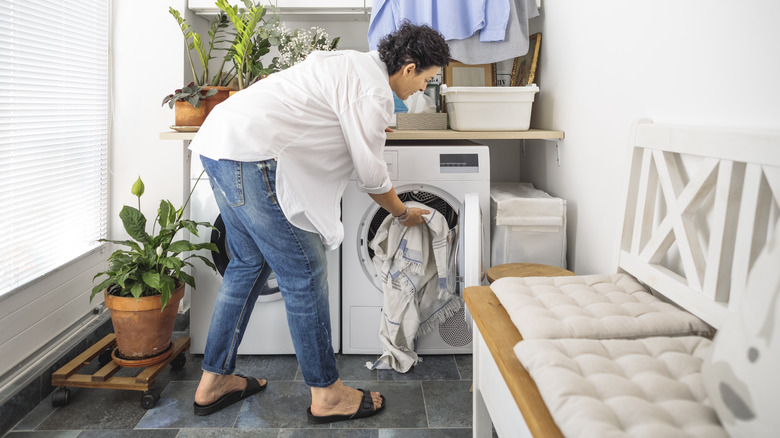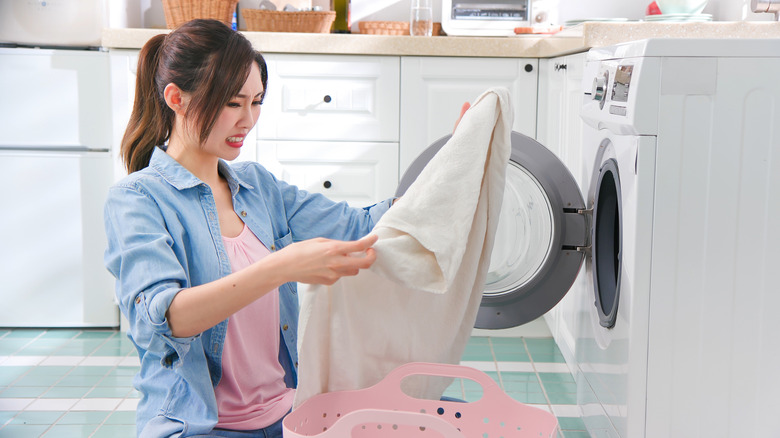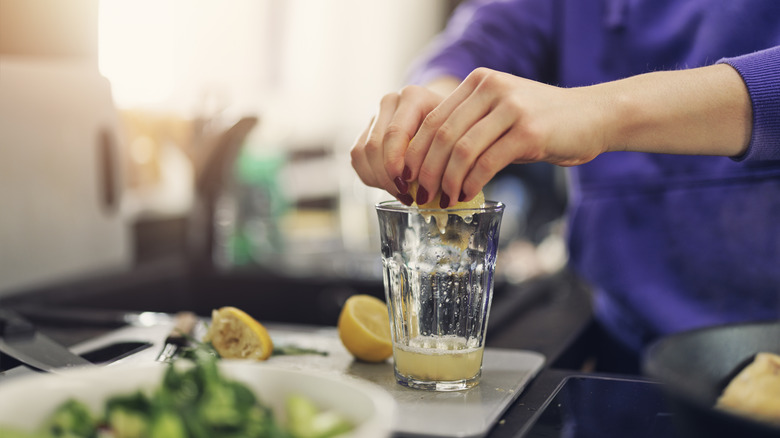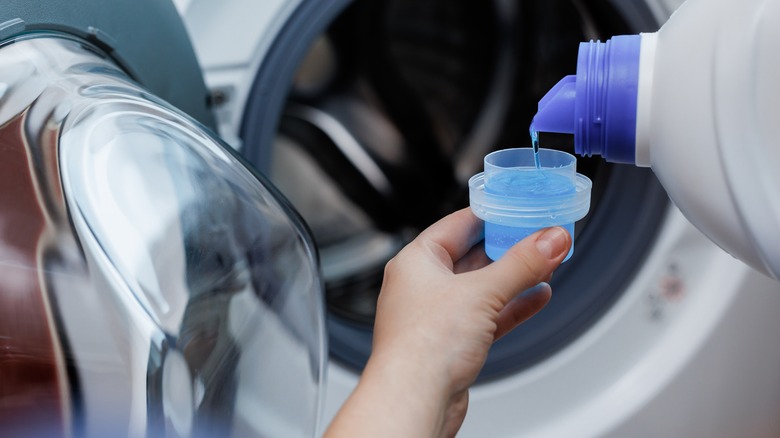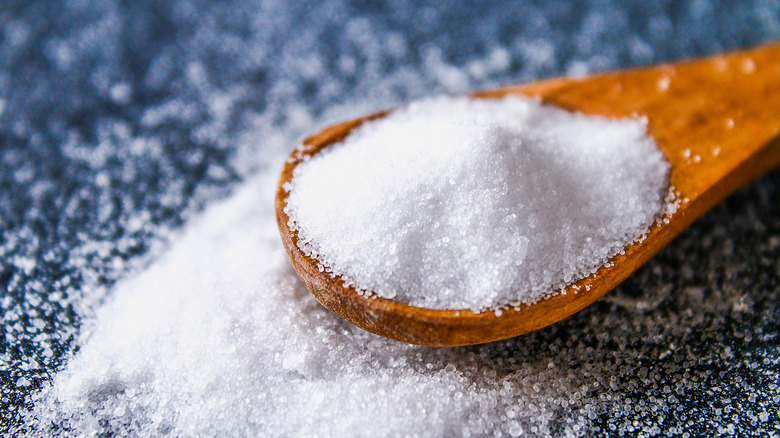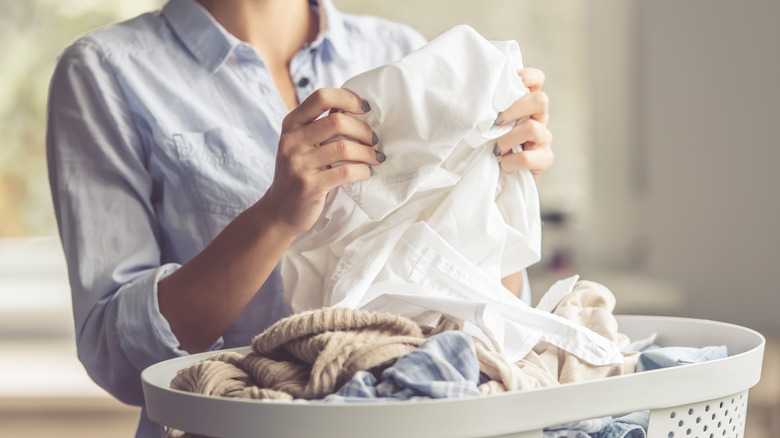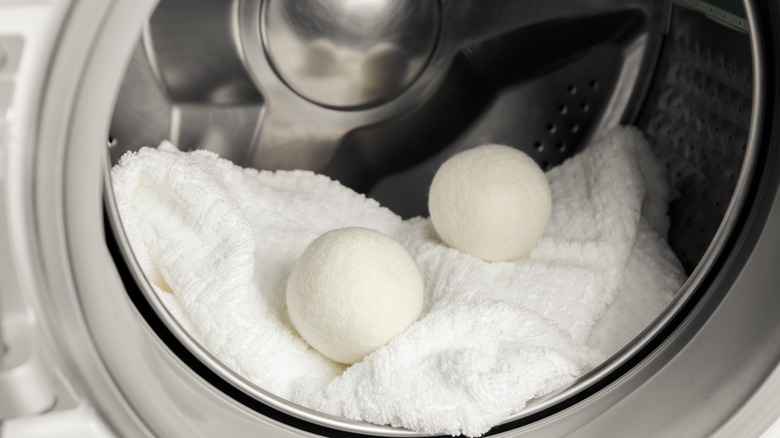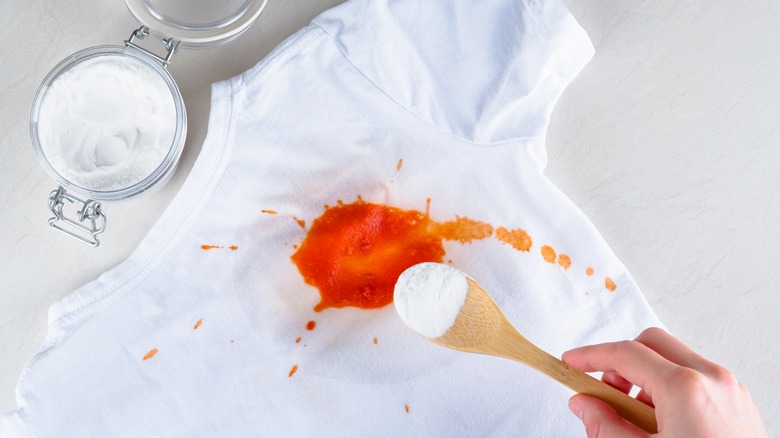Natural Ingredients You Should Be Adding To Your Next Load Of Laundry
Laundry can seem like a never-ending task, especially if your clothes have stubborn marks or feel rough to the touch after too much washing. You may think that reaching for a stain-removal product or a fabric softener is the logical next step, but it doesn't have to be. If you're trying to avoid or cut down on your use of chemicals in the laundry room, the good news is that there are plenty of natural ingredients you can add to your next load.
Products made for removing various smells and stains are effective, but they can also be expensive. Plus, many laundry staples like detergent and fabric softener are filled with strong fragrance that could irritate skin. Whether you're looking to get rid of stains, improve unpleasant odors, or leave your clothes feeling soft (or all three), the natural ingredients below can do it all. From classic table ingredients like vinegar, salt, and lemon juice to baking soda, borax, and wool dryer balls, there's an ingredient to solve every laundry-related issue.
Vinegar
Everyone knows that vinegar is great for seasoning dishes, but white vinegar specifically is also an excellent natural ingredient to add to your laundry. It works so well because its highly acidic formula will naturally banish any lingering residue on clothes. Residue might not be visible, but it could be causing your clothes to stink faster, your whites look gray, and your once-soft sweaters coarse and rough. It's thought that vinegar will get rid of mold and mildew from clothes that have been stored in a cold place for too long, too.
Speaking to Real Simple, housekeeping expert Melissa Maker highly recommended using vinegar in the laundry room. Maker suggests swapping out fabric softener for vinegar, saying, "I just fill my fabric softener compartment up to the line, you can't really screw it up." However, though vinegar's high acidity content is good for stain-removing matters, it has the potential to harm your machine over time, so don't add vinegar to every load. Using the ingredient once or twice a week is more than enough. Additionally, you might want to wash your machine out after adding vinegar to ensure none remains for the next time you do a wash.
Lemon juice
Not just for adding zestiness to a dish, lemon juice could be the brightening agent you've been looking for. It's also thought to remove sweat and rust stains. Although there's no specific scientific evidence to back up the fact lemon juice is a great addition to your laundry, several cleaning experts have weighed in on its cleaning power. As Bret Jackson, professional cleaning pro, told Homes & Gardens, "Lemon juice is a natural disinfectant and will help to kill any bacteria that may be present on your clothing. It is a natural fabric softener and will help to keep your clothes looking and feeling their best."
Jackson shared that lemon juice will lend a fresh scent to your laundry, too. "Laundrylicious" founder Marieke van der Graaf confirmed the latter, sharing with Reader's Digest that lemon juice will additionally bleach garments and leave white clothing looking brand new again. You may think that lemon will damage your clothes due to its acidity, but Jackson says this isn't the case. Simply add half a cup alongside your detergent the next time you do a wash. As it's a bleaching agent, you should only add lemon juice to your white laundry loads to prevent any fading of your clothes.
Hydrogen peroxide
Hydrogen peroxide is normally used for disinfecting purposes, but it's also an amazing way to breathe new life into clothes that are looking a little gray. It's additionally a good replacement for bleach if you want to go chemical-free in your laundry room. Though the stain-removing and freshening effects of hydrogen peroxide haven't been scientifically proven, laundry experts swear by it.
Allison Evans, co-founder of Branch Basics, spoke to The Spruce about how she likes to use hydrogen peroxide. "To use, add one cup of hydrogen peroxide (the one in the brown bottle) directly to the washer," Evans shared. "Peroxide also works wonders to remove nearly any type of stain from white clothing and is a natural disinfectant." As with lemon juice, hydrogen peroxide should only be used on white clothing to prevent unintentional bleaching or fading of brighter clothes. Avoid using it on delicate fabrics too. Another thing to keep in mind is to make sure you're using the 3% bottle, as other formulations may be too strong.
Salt
This humble kitchen ingredient will do more than just make things taste delicious. It can banish notoriously tough stains like blood and grease marks. However, before you go adding heaps of salt to your washing machine, pause a second. According to cleaning experts, salt is best used before you load your laundry as a stain-removing agent. Per Branci Winch, owner of HomeMaid Home Solutions, "Salt is not a laundry booster, per se, but it can be effective in removing certain stains" (via Reader's Digest).
Depending on the type of stain, you'll need to apply the salt in a different way. If your favorite clothes have blood stains, pre-soak the items in a large tub filled with cold water and salt for at least an hour before washing as normal. Accidentally got some grease on your t-shirt while enjoying a meal? Instead of soaking the garment, let loose with a bunch of salt on the mark and leave it to sit until it has been mostly absorbed. Sweep away any excess salt before putting the item in the machine as per usual.
Borax
You may not think that borax (sometimes called sodium borate) counts as a natural ingredient, but, actually, it's a naturally-occuring mineral salt with no added ingredients. However, because it's available under many brand names, always check that you're picking one with no additives so it remains natural. Though it has fallen out of favor somewhat in the past few years, borax is still an excellent addition to your home and will make your lights and whites more vibrant. It hasn't been tested scientifically, but sustainable blogger Julia from Simply Living Well shared via her Instagram that she uses it as a base for making an alternative laundry detergent.
Mix a cup of borax with a bar of castile soap and a cup of washing soda. Grind (either manually or with a food processor) a bar of castile soap into powder and then mix with a cup of borax and a cup of washing soda to make your very own homemade laundry detergent (this mix will create approximately 32 tablespoons worth). Note that, while borax should be safe to use in your machine, it should never be applied directly to the skin or ingested due to dangerous side effects like stomach upset at low levels and seizures at high levels. It can also cause skin irritation, so use with caution if you have sensitive skin.
Wool dryer balls
Round and fluffy, wool dryer balls do more than just look cute. Though it hasn't been proven scientifically, the laundry room essentials are said to reduce drying times and stop your items sticking together in the machine so you aren't left with one large, soggy mess. Experts also love them. Adam Morris, engineer of Appliances Made Simple, told Real Simple that "dryer balls are a great solution to cut drying time and save money on your energy bill." Plus, per the Seattle Times, laundry expert Patric Richardson shared, "I love wool dryer balls. I love that they soften and that you can add essential oils to them for fragrance."
Like Richardson pointed out, some people use wool dryer balls as a replacement for fabric softener by adding essential oils. If you plan to do this, ensure that you always keep essential oil bottles away from animals. Though fine for humans (when used as directed), they can be toxic when ingested or applied directly to the skin by your beloved pets. It's also best to be mindful about adding too much fragrance so you don't irritate your skin.
Baking soda
You may know that baking soda is excellent when it comes to cleaning your home, but it's also a must-have addition for your laundry routine. Several experts, including Wayne Edelman of Meurice Garment Care, have shared that the common kitchen ingredient will act in a similar way to hydrogen peroxide, i.e remove stains and make your clothes smell fresher. Via The Spruce, Edelman revealed that baking soda could brighten whites and restore the vibrancy to your faded t-shirts.
Per Homes & Gardens, laundry expert Penny Nicholas explained how baking soda works, stating, "When used in your laundry, baking soda helps to regulate the pH level in the washing water by keeping it from being too acidic." As with anything you add to your laundry, Edelman says that baking soda should be used in a small amount, warning, "It will leave a powdery residue if not dissolved." Moreover, Nicholas says it's best to keep baking soda away from "protein-based fibers like silk, cashmere, wool, or other clothing made with pH sensitive-dye," as it could draw out the dye from these garments.
